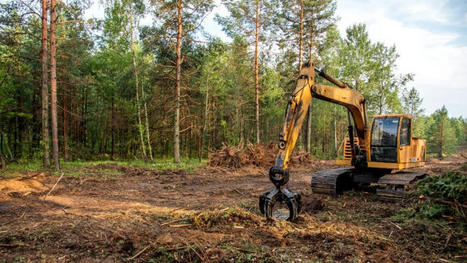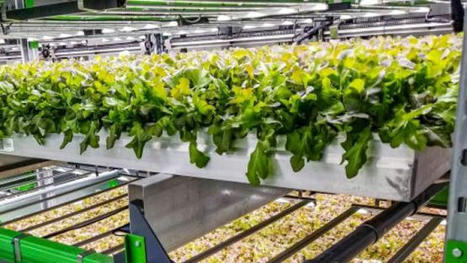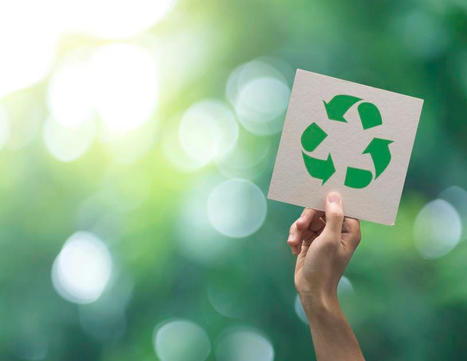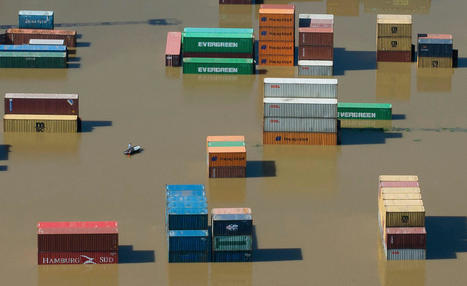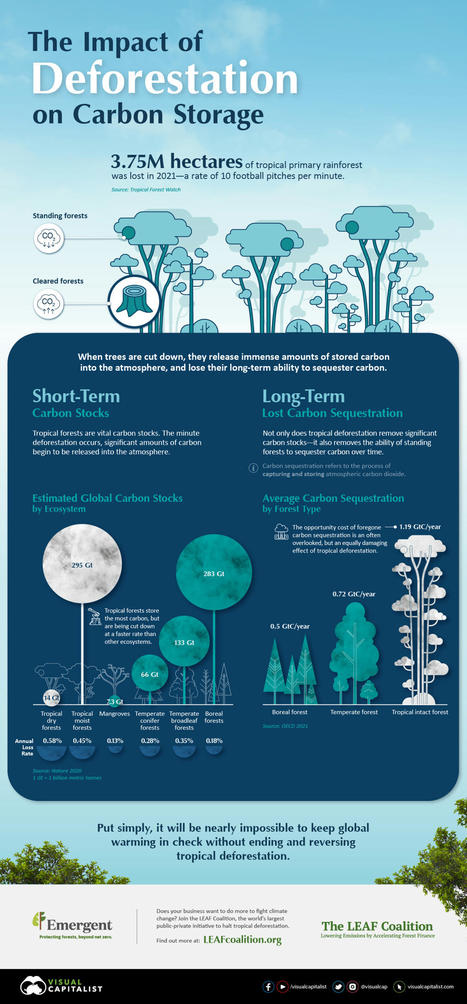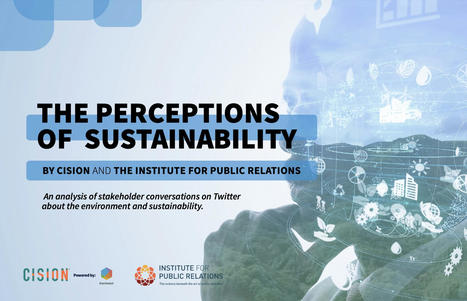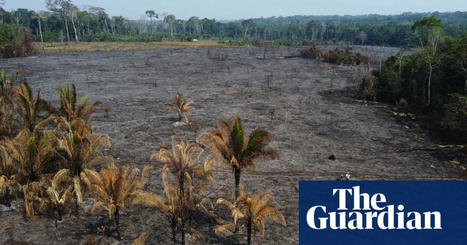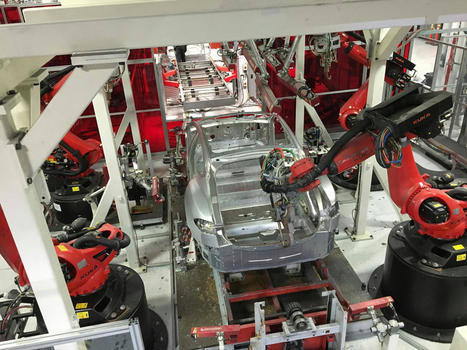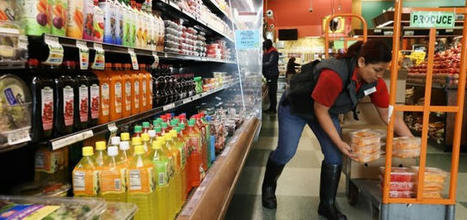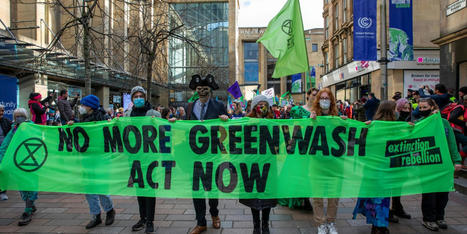 Your new post is loading...
 Your new post is loading...
Germany is likely to generate enough energy from renewables to meet more than 50% of its energy demand by the end of this year, as the country’s Economy Minister Robert Habeck announced at a conference held by the Heinrich Böll Foundation on Monday.
As of 2022, Germany’s solar photovoltaic capacity was at about 67 megawatts, followed by about 58 megawatts of capacity from onshore wind energy and about 8 megawatts from offshore wind, according to a February 2023 report from the Federal Ministry of Economic Affairs and Climate Action.
Via EcoVadis
The European Parliament and EU member states reached an agreement late on Thursday (10 November) on a new law regulating the contribution of the forestry and land use sector to the EU’s 2030 climate goals.
The land use, land use change and forestry (LULUCF) sector covers the use of soils, trees, plants, biomass and timber and is responsible for emitting and absorbing CO2 from the atmosphere.
Under the political agreement reached yesterday, the EU will aim to remove 310 million tonnes of net CO2 equivalent from LULUCF sectors by 2030.
“CO2 carbon sinks can help us achieve our climate goals, including carbon neutrality, and thus protecting our planet from the fatal negative consequences of climate change,” said Marian Jurečka, the Czech minister of the environment whose country currently holds the EU’s rotating six-month presidency.
“At the same time, the deal ensures different circumstances in each member state are taken into account when setting further ambition towards the 2030 targets,” Jurečka said in a statement.
Via EcoVadis
Sustainable or green IT is not new. In fact, it has been a topic of discussion among IT leaders for decades. But the concept of sustainability in general, which the United Nations defines as “meeting the needs of the present without compromising the ability of future generations to meet their own needs,” is something people and organizations are prioritizing more than ever — and for good reason.
Concerns about the environment and climate change are front and center among world leaders, environmental advocacy groups, and society at large. Corporate executives and boards want their organizations to do their part — or at least be perceived as doing their part — to help.
The push for better environmental, social, and governance (ESG) initiatives has taken a high priority at many organizations, and this encompasses more efficient uses of technology.
Via EcoVadis
German wholesale giant Metro aims to reduce water consumption across its operations by 10% per square metre of net operating space by 2030 compared to the base year 2021.
The move will contribute to the global community's Sustainable Development Goal (SDG) 12, which seeks to produce and consume sustainably and reduce the company's operating costs.
The new target replaces the previous goal of a 5% reduction in water consumption by 2025 compared to fiscal year 2016/17, the wholesaler noted.
The company exceeded this target by cutting water consumption by 19% in the current fiscal year.
Ivonne Bollow, SVP of public policy and corporate responsibility at Metro AG, said, "Water scarcity is one of the biggest global challenges today. Global water demand is continuously increasing, while available water resources are steadily declining due to climate change – with drastic consequences for the world's food supply and nutrition. [...]
"As a globally active food wholesaler, water and climate protection are therefore a high priority for Metro and we have set ourselves ambitious goals that we will consistently pursue and, if necessary, formulate even more ambitiously."
Via EcoVadis
In 2002, Ficosa was one of the country’s first companies in the sector to join the Compact, as part of its commitment to sustainable development, which is key to the company’s present and future strategic vision.
Since then, Ficosa has periodically renewed its participation in the Global Compact, aligning its sustainability strategy with the Sustainable Development Goals (SDGs) across the organisation in all 16 countries in which it operates. This strategy encompasses a variety of projects in the environmental, social and governance fields, and it extends along the entire value chain, encompassing employees, customers and suppliers.
One of the company’s main goals in this regard is to achieve climate neutrality by 2030, reducing 100% of Scope 1 and Scope 2 emissions. To this end, efforts are being made to increase the use of renewable energies to the detriment of fossil fuels. So, for instance, the company is constantly analysing its processes to make more efficient use of its resources. It is also developing various projects in this regard, such as the installation of photovoltaic panels on the roof of some of its plants, some examples of which are already in operation in Taicang (China) and Maia (Portugal). Furthermore, 11 of its centres already use 100% renewable energy, and, by the end of the year, it is estimated that around 64% of the Group’s electricity consumption will be from renewable sources. Through these initiatives, it is estimated that CO2 emissions will drop by 17,800 tonnes in 2022 alone.
Via EcoVadis
Seemingly a little forgotten about in the fight against climate change, methane emissions are an incredibly potent contributor to warming the earth. Aiming to change that, Germany-based startup Orbio Earth has just raised €600k for its methane intelligence solution.
The race to net zero with respect to carbon emissions is firmly on and startups, corporates, governments and individual civilians are all part of it. Fresh innovations, key targets and strict regulations are all helping fuel this forward. However, methane emissions are also a massive contributor to the climate crisis – we just don’t talk about it as much.
It’s reported that over a 20-year period, methane is actually 80% more potent at warming the earth than CO2.
Germany-based startup, Orbio Earth, is on task to accelerate the low-carbon transition with actionable methane intelligence and it’s just raised €600k to do so.
Via EcoVadis
Road transport is the most prioritized area to reduce CO2 emissions, according to leading e-commerce and manufacturing companies in Europe. A new report carried out by Ipsos and Volvo Trucks shows that companies are willing to pay more for transport suppliers with lower CO2 emissions.
The research company Ipsos has, on behalf of Volvo Trucks, interviewed 100 large e-commerce and manufacturing companies in eight European countries about their demand for fossil fuel free transports in future procurements.
The vast majority of these companies have set targets to reduce their climate footprint. 78% of those interviewed say that they are willing to pay more for a transport supplier with little or no CO2 emissions and 85% are prepared to change transport suppliers if they don´t meet their requirements.
Via EcoVadis
The country’s most sustainably minded retailers are placing more of an emphasis on sourcing — by both boosting locally and sustainably produced food and by requiring stricter environmental standards from their suppliers. This ranges from sourcing more sustainable seafood, including canned tuna, to ensuring that beef is being produced with no deforestation. Palm oil, coffee, eggs, soy and pulp are other commodities that are being more closely watched by grocers to ensure sustainable production.
In fact, the 2022 Sustainability Barometer released by London-based Mintel finds that from a global consumer perspective, concerns about water and food shortages are now being prioritized ahead of previous preoccupations with waste and plastic. Therefore, it makes sense for grocers to include messaging about their efforts in more sustainable sourcing and in combating climate change.
Several retailers, including Batavia, Ill.-based Aldi US, are committing that all of the fresh, frozen and farmed seafood they purchase will be third-party certified as sustainable or from fishery improvement projects by the end of 2025. Meanwhile, expect to see more of these grocers ramp up tracing efforts so that customers will also recognize their efforts in sustainability.
Via EcoVadis
If we want to save the planet, we must change the way we move goods around it. We must create more sustainable supply chains.
In their 2021 study The Sustainable Supply Chain Paradox: Balancing the Bottom Line with the Green Line, researchers from Oxford Economics and SAP wrote, “The moment for setting small-scale sustainability goals has passed. For companies across sectors and around the world, creating and maintaining greener supply chains is an increasingly urgent priority.”
Via EcoVadis
Five years ago, the capital allocated to ESG was around $5-6 trillion, in 2022 it has multiplied to $30 trillion.
Via EcoVadis
“As the first plastic tax to be implemented globally, the UK PPT is a harbinger of the worldwide movement reinforcing the polluter pays principle alongside extended producer responsibility,” said Stephen Jamieson, global head of circular economy solutions at SAP. “By disincentivising the use of unsustainable materials, the government is at the same time incentivising the market value of recyclable plastic, fostering a sustainable circular economy that will have global repercussions.”
Via EcoVadis
Investors stepped up pressure on corporate climate lobbying on Monday, launching a new 14-point action plan for companies to stick to or risk having their actions put to a shareholder vote.
The Global Standard on Responsible Climate Lobbying urges companies to commit to responsible climate lobbying, disclose the support given to trade groups lobbying on their behalf and take action if it runs counter to the world's climate goal.
That goal, to cap global warming at 1.5 degrees Celsius above pre-industrial norms by mid-century, is moving increasingly out of reach, scientists say, with urgent action needed in the short-term to have any hope of reaching it.
Via EcoVadis
The Covid pandemic has rightly received most of the blame for global supply chain upheavals in the last two years. But the less publicized threat to supply chains from climate change poses a far more serious threat and is already being felt, scholars and experts say.
The pandemic is “a temporary problem,” while climate change is “long-term dire,” said Austin Becker, a maritime infrastructure resilience scholar at the University of Rhode Island. “Climate change is a slow-moving crisis that is going to last a very, very long time, and it’s going to require some fundamental changes,” said Becker. “Every coastal community, every coastal transportation network is going to face some risks from this, and we’re not going to have nearly enough resources to make all the investments that are required.”
Via EcoVadis
|
Humans are facing an existential crisis in climate change. We are also facing a crisis of collective action. As a species, we have every reason to slow the rise of global temperatures, but taking steps to cut carbon emissions is generally not in the short-term interest of individuals, companies, or countries. Where does that leave IT organizations?
IT systems all around the world consume ever-increasing amounts of electric power, making them a critical factor in increasing carbon emissions. Many people in the industry are acutely aware of IT's climate impact and want to see it reduced, but minimizing IT's carbon footprint will entail a cost that many small businesses and multinational corporations are reluctant to bear.
Curious about what might incentivize a shift to greener tech, I spoke to IT leaders who are pushing back on climate change. I found people working at every level of organizational leadership—from the top down to the bottom up—and pursuing a variety of strategies to reduce carbon consumption in company products and business models.
Via EcoVadis
In the last two decades, many companies have made pledges to eliminate deforestation from their supply chains. Have these pledges been effective? New research published in the scientific journal Environmental Research Letters shows that when it comes to sourcing soy from the Amazon region, zero-deforestation pledges (ZDP)—made in support of Brazil’s Soy Moratorium, which banned sourcing soybeans produced on deforested land after 2006—have been mostly ineffective.
Conducted by researchers from the University of Cambridge, Boston University, ETH Zurich, and New York University, the research found that ZDP pledges were made by at least 94 companies through 2021, and the majority of these were not effectively implemented.
From 2006 to 2015, researchers found that these pledges reduced tree clearance in the Brazilian Amazon by only 1.6 percent—or approximately 2,300 km2, or an area that is smaller than Rhode Island, the smallest US state. After fossil fuels, deforestation is the second largest contributor of greenhouse gas emissions.
Via EcoVadis
The climate has moved into the spotlight in businesses with a new report from Ericsson finding that 42% of decision-makers believe they will face disruptions to their enterprise in the near future due to natural disasters caused by climate change. Other unforeseeable events are also expected to create challenges, such as the energy crisis, pandemic and global conflict, the study said. And while leaders recognize preparedness is critical, there is a need to move from reactive strategies toward long-term resiliency planning, shifting away from recovery-oriented resilience, the report indicated. Not all events are equal—energy crises, pandemics and cyberattacks are regarded as the likeliest and most severe events. Four times as many decision-makers and employees agree that there will be more frequent and severe disruptive events in the future, the report said. After climate change, respondents also cited cyberattacks and ransomware, in particular, as the most experienced events by enterprises, along with supply chain disruptions. Both the COVID-19 pandemic and the current Russia-Ukraine conflict are mentioned as key drivers for these supply chain challenges.
Via EcoVadis
The Impact of Deforestation on Carbon Storage
A one degree change in temperature could have catastrophic consequences.
One of the most notable influences on rising global average temperatures comes from deforestation. In fact, combined emissions from deforestation are higher than the annual emissions of any other country (apart from the U.S. and China) and contribute to roughly 12% of total annual greenhouse gas emissions.
This graphic from The LEAF Coalition takes a closer look at the impact deforestation has on global greenhouse gas emissions through carbon storage.
Via EcoVadis
BCG recently conducted a global survey of 1,000 leaders in A.I. and climate that tells us more about that potential—as well as the barriers getting in the way. We found that 87% of respondents feel that advanced analytics and A.I., or simply “A.I.,” is a helpful tool in the fight against climate change today, but only 43% say that they have a vision for using A.I. in their own climate change efforts.
They see the greatest business value for AI in the reduction and measurement of emissions. In fact, there are many diverse ways in which global leaders can use A.I. to achieve their goals:
Via EcoVadis
Environmental, Social, and Governance (ESG) is shaping up to be the corporate mantra of the 2020s, with the majority (83 per cent) of Australians concerned about climate change, according to the annual Ipsos Climate Change Report 2022.
In Europe, we have seen the introduction of supply chain legislation that will make companies accountable for the behaviour and performance of their suppliers in a way never seen. As is the way of these things, we will no doubt be seeing a similar legislative effort on our own shores in the near future.
The way we view our responsibilities as corporations, from the board down, is shifting. But this change has been slow. Current measures are not enough, on their own, to push corporate Australia down the necessary path to Net Zero.
Board buy-in is necessary
Only 18 per cent of businesses have set a Net Zero goal, and of those businesses that have set a goal, only 21 per cent are taking steps to achieve it, according to research at Energy Action. That’s a fraction of the buy-in that we need.
Via EcoVadis
Organizations are increasingly turning their focus to fighting climate change through sustainable practices. A 2022 report by Deloitte found that 89% of executives agree there is a global climate emergency. Sustainable organizations are also being rewarded financially for their efforts. A Korn Ferry study found that purpose-driven companies post compound annual growth rates of 9.9% compared to an average of 2.4% for S&P 500 companies overall. However, companies are still accused often of greenwashing, or the act of making false or misleading claims about the environmental benefits of a product, service, technology, etc. (Corporate Finance Institute, 2022).
Via EcoVadis
Indigenous leaders from the Amazon have implored major western brands and banks to stop supporting the ongoing destruction of the vital rainforest through mining, oil drilling and logging, warning that the ecosystem is on the brink of a disastrous collapse.
Representatives of Indigenous peoples from across the Amazon region have descended upon New York this week to press governments and businesses, gathered in the city for climate and United Nations gatherings, to stem the flow of finance to activities that are polluting and deforesting large areas of the rainforest.
Via EcoVadis
The Securities and Exchange Commission on Monday approved a landmark proposal to require all publicly traded companies to disclose their greenhouse gas emissions and the risks they face from climate change.
Via EcoVadis
Growing consumer awareness and increased government initiatives around sustainability and climate change are adding pressure on industries to adopt sustainable practices. This is particularly true of the food and beverages (F&B) sector where food production is responsible for one-quarter of the world’s greenhouse gas emissions. Left unchecked, this figure will only rise due to the combined impact of a rising population and growth of the middle class – wealthier people consume more resource-intensive, animal-based foods. According to the World Economic Forum, by 2050, the demand for food will be 60 per cent greater than it is today.
Via EcoVadis
With consumers prioritizing environmental sustainability, Amazon and Target unveiled stores that aim to use less energy than they produce, the retailers announced last week. Target's first net-zero energy store is located in Vista, California, and the new Amazon Fresh store, which is pursuing net-zero carbon certification, is located in Seattle. The new Amazon Fresh Seattle location features a CO2-based refrigeration system, has steel byproducts to reduce embodied carbon and fully sources its electricity from the company's renewable energy projects. Target's store has solar carports, CO2 refrigeration and LED lighting. Drawing from its experience, Target said it plans to add CO2 refrigeration to all of its stores by 2040. Amazon said that some of the upgrades will be used at all of its Amazon Fresh grocery stores going forward, such as the lower-carbon concrete flooring.
Via EcoVadis
Corporate greenwashing is an increasingly contentious topic around the globe. Now, European policymakers claim they are stepping up their fight against it.
Amid a record inflow of investments into European climate-friendly funds, the region’s top markets regulator, the European Securities and Markets Authority (ESMA), published a new road map last month, in which it identified tackling greenwashing as a priority for the next two years.
Via EcoVadis
|



 Your new post is loading...
Your new post is loading...



